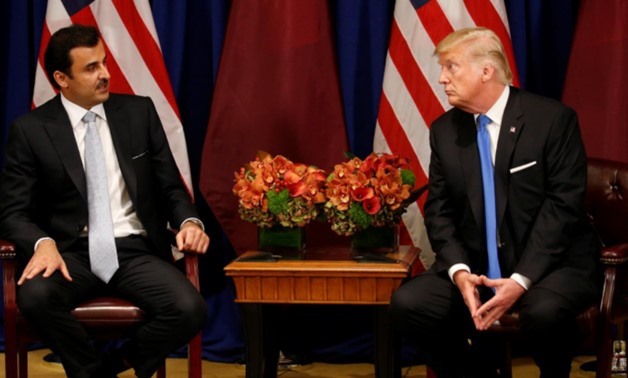
U.S. President Donald Trump meets with Qatar's Emir Sheikh Tamim bin Hamad al-Thani in New York U.S. September 19-2017 - REUTERS
CAIRO – 31 January 2018: Nearly nine months into the boycott imposed on Qatar, the authorities are trying to make it up for the economic implications suffered by the regime due to its atrocities.
Al-Jazeera's correspondent in Washington Patty Culhane said that the Qataris are extending their sway on the U.S by infiltrating heavily in its economy.
“The Qataris kept mentioning that they are investing 100 billion dollar in the U.S. economy,” Culhane said, adding that the volume of investments is expected to increase if the boycott will be lifted.
Culhane’s statements came during the current visit of a high-level Qatari delegation to Washington for mutual talks on enhancing cooperation in the fields of energy and infrastructure.
"In Washington for Qatar-USA Strategic Dialogue; focusing on areas of cooperation including trade and investment, defense, security and counterterrorism,” tweeted the Qatari Foreign Minister Mohamed Abdel Rahman on Tuesday.
Qatari Leaks released a video on Sunday claiming that Qatar intends to recognize virtual currencies such as Bitcoin, in a move that would prompt major world economies that reject virtual currencies, to cut their economic ties with Qatar.
Qatari Leaks, a platform specialized in exposing Doha's strategies to support terrorism, said that virtual currencies are untraceable so it can be used to finance terrorism without any financial control. Therefore, the world has been fighting virtual currencies, because it has a very negative impact on the international economy.
Qatari banks have been suffering from accumulated foreign debts amounting to QR 177.3 billion since the start of the Gulf crisis in June 2017.
The diplomatic boycott has also burdened the Qatari banking system as the Qatari Central Bank noticed in July the outflows of funds from some non-residents resulting from the increased pressure on the foreign reserves.
Since June 5, Egypt, Saudi Arabia, Bahrain and the United Arab Emirates have turned on Qatar with a complete air and trade boycott over allegations of its support and sponsorship of terrorism, which Doha denies.
Following the Arab boycott of Doha, a list of 13-demands was handed to Doha’s government by Egypt, Saudi Arabia, the UAE and Bahrain for reconciliation which includes the closing of Al-Jazeera broadcasting and the suspension of its cozy relationship with the extremist government of Iran.
Since then, Qatar has resisted conciliation attempts, and has not shown any efforts in disassociating itself from the terrorist groups which were proven to be harbored and financially supported by Doha.

Comments
Leave a Comment